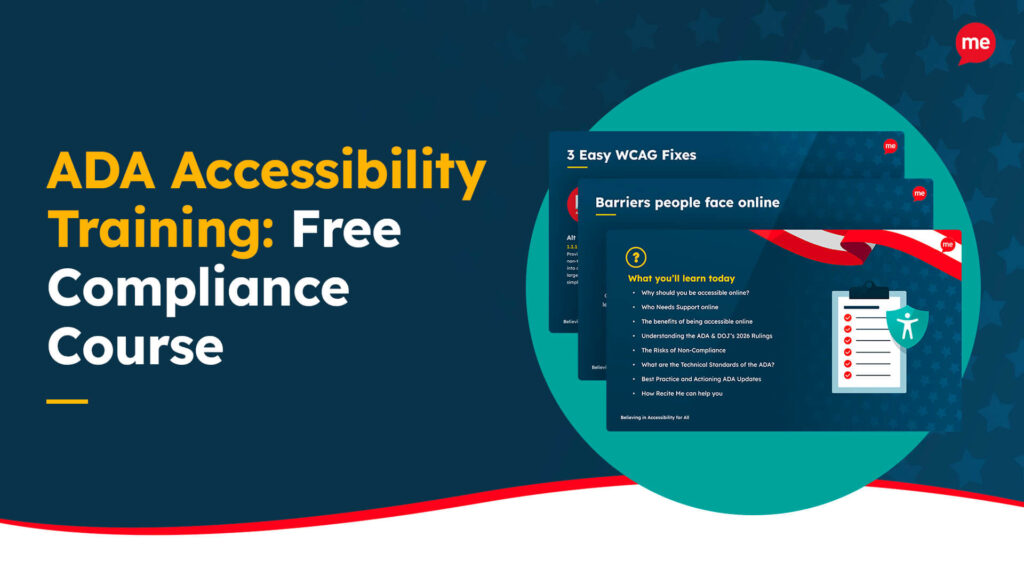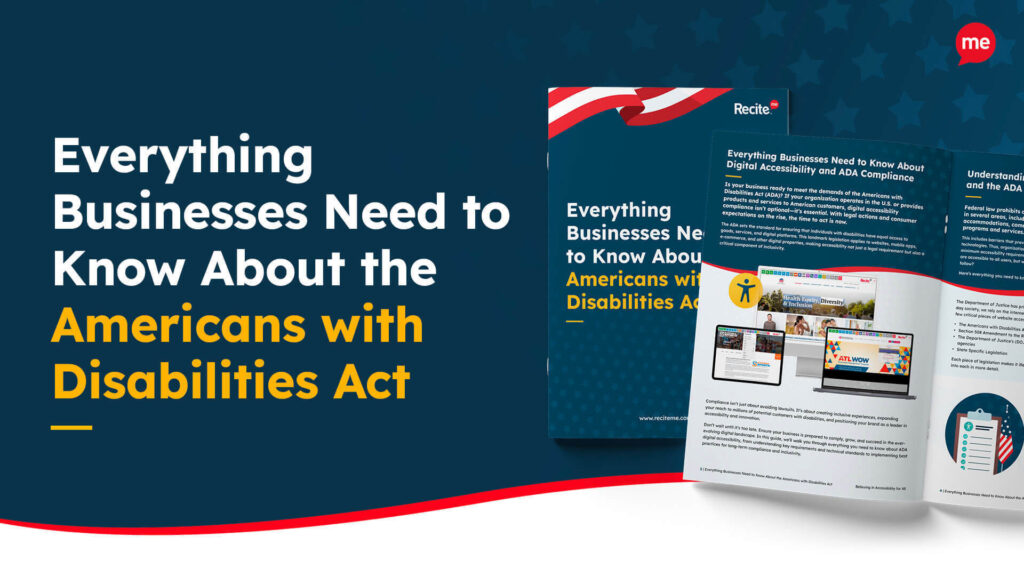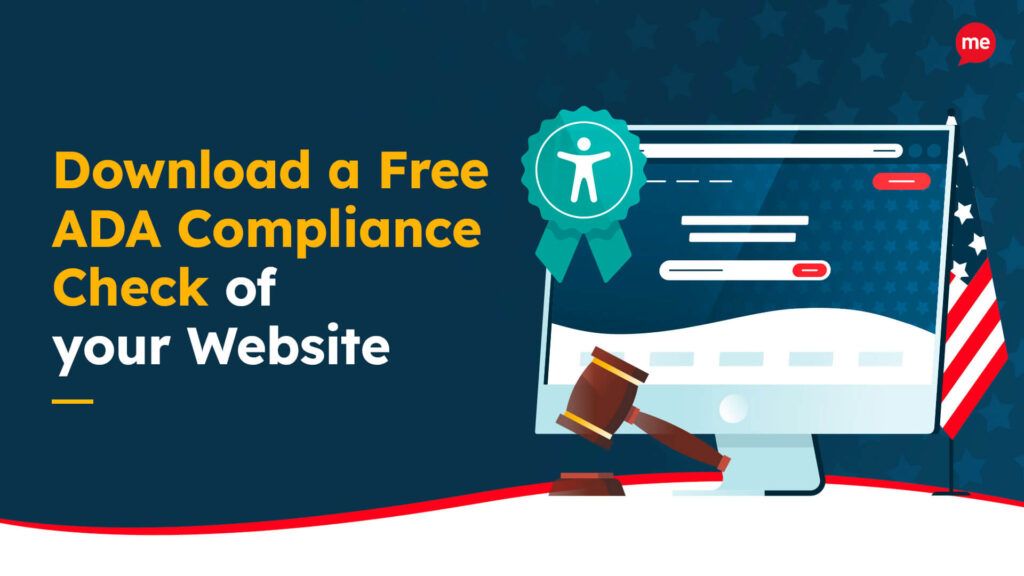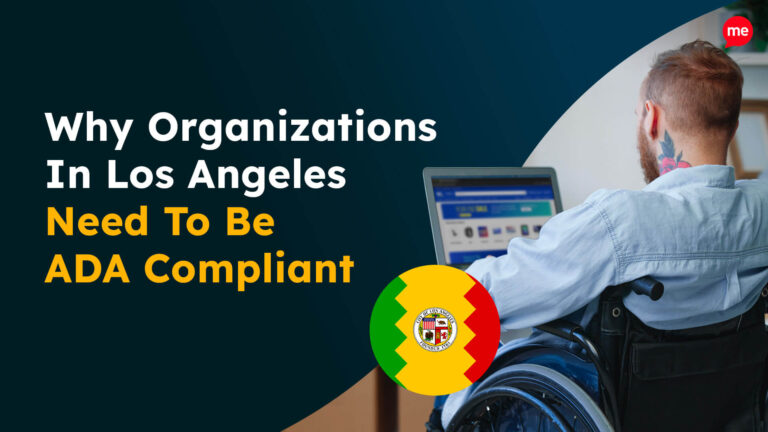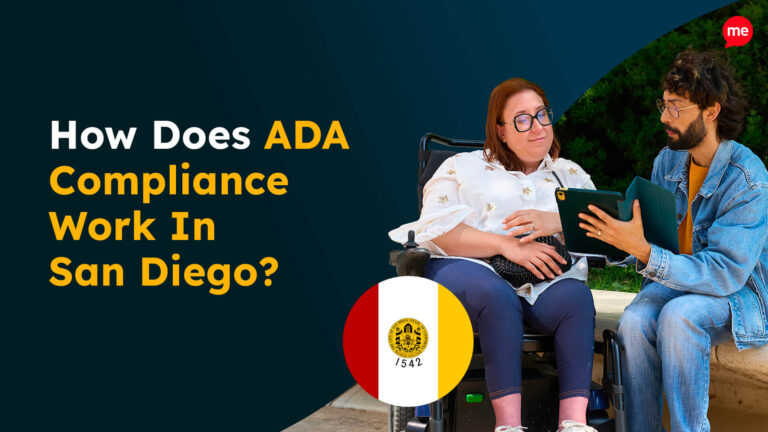Get A Free ADA Compliance Audit Of Your Website
Download NowWebsite accessibility can be a difficult topic for business owners to navigate. However, developing an understanding of the Americans with Disabilities Act (ADA) is essential, as inaccessible online content can expose your business to significant legal risk, reputational damage, and lost revenue.
The Department of Justice (DOJ) has made clear that businesses must provide equitable access to websites and online services, just as they would at physical stores. In this guide, we’ll outline the ADA compliance requirements for private sector organizations and explain how they apply to websites, digital services, and online platforms.
How is the ADA and how does it affect businesses?
The ADA is a civil rights law that prohibits discrimination against people with disabilities. It applies across multiple areas of public life and is divided into five titles:
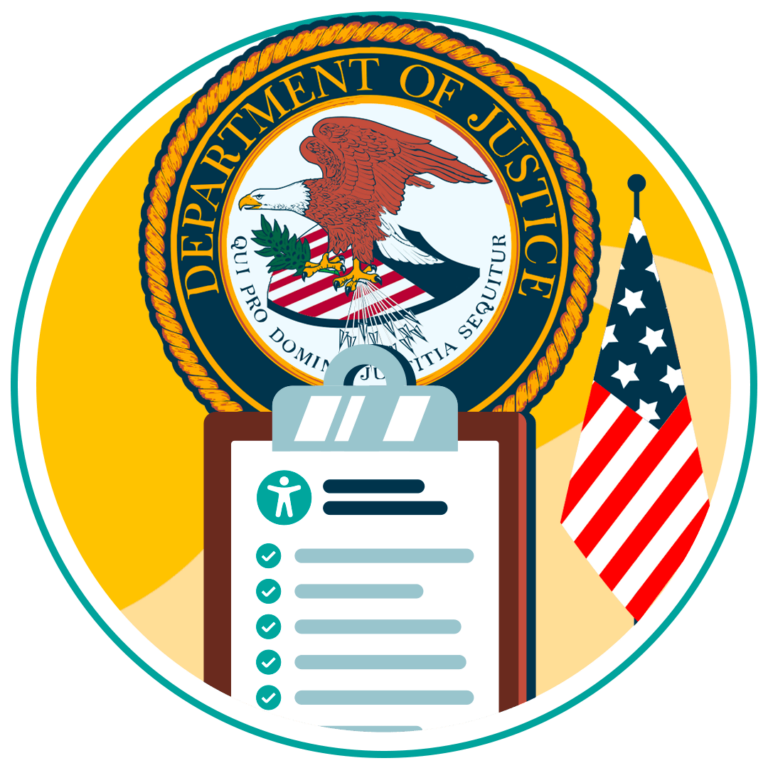
- Title I: Employment
- Title II: State and local government services
- Title III: Public accommodations and commercial facilities
- Title IV: Telecommunications
- Title V: Miscellaneous provisions
For most businesses, Title III is the most relevant. It requires that places of public accommodation be fully accessible to individuals with disabilities. This includes online stores and apps that sell goods or services.
Title I may also apply if your business employs 15 or more employees. In this case, you are expected to provide equal access to employment opportunities, including accessible recruitment processes and reasonable workplace accommodations.
Want to make sure your website is compliant with the Americans with Disabilities Act? Then unlock the ADA compliance checklist now. Discover actionable steps to ensure ADA compliance, helping you avoid lawsuits and any other negative consequences of non-compliance.
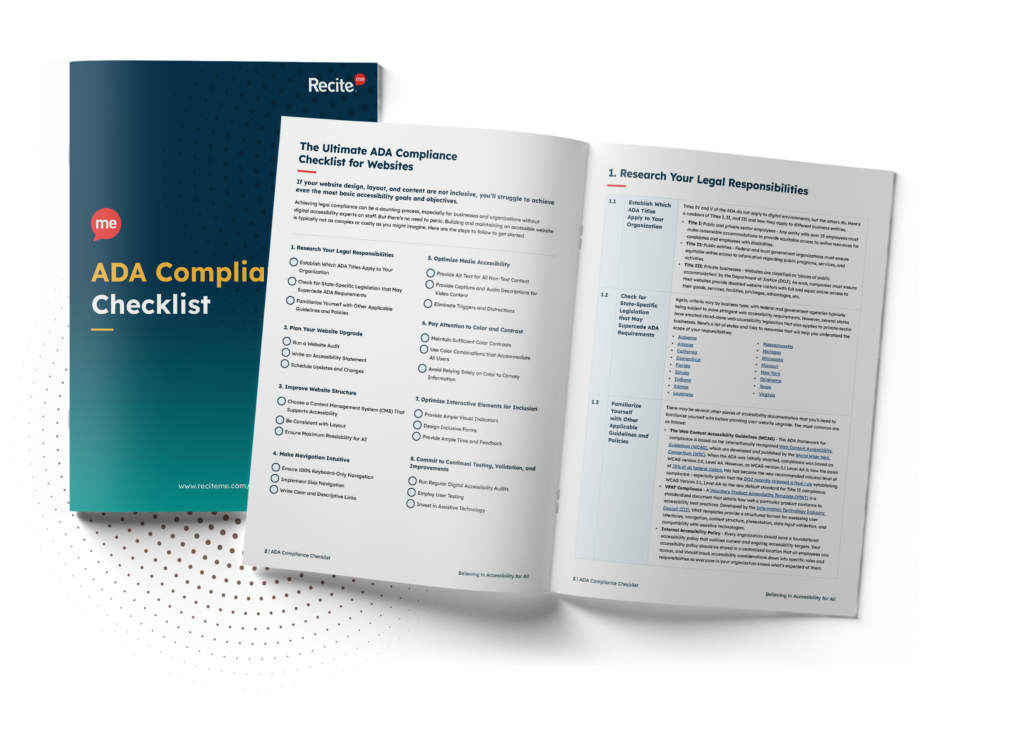
Which types of business are affected by the ADA?
Any business that serves the public falls within scope, regardless of size or industry. This includes, but is not limited to:
- E-commerce retailers and online service providers
- Restaurants, hotels, and entertainment venues
- Professional services such as legal, financial, and healthcare providers
- Educational and training organizations
It is a common misconception that small businesses are exempt from ADA compliance. However, while Title I obligations apply only to companies with 15 or more employees, Title III applies to all businesses, regardless of workforce size. Furthermore, it is essential to note that businesses that operate exclusively online are not exempt because digital-only services can still deny equal access when online barriers are present.
What is the standard for ADA compliance?
The ADA does not name a specific technical standard for inclusive website design. However, enforcement actions, court rulings, and settlements all reference the Web Content Accessibility Guidelines (WCAG). Aligning with WCAG 2.2 Level AA is widely considered best practice for meeting ADA compliance requirements.

Incentives for ADA compliance
Accessibility improvements can deliver several operational and commercial benefits for businesses:

- Potential eligibility for federal tax credits: Many small businesses can claim Disabled Access Tax Credits for making accessibility improvements.
- Improved usability: Accessibility best practices such as clearer navigation, better contrast, and consistent page structure improve overall usability for everyone, not just users with disabilities.
- Broader audience reach: Around one in four Americans has a disability. Improving accessibility helps remove barriers that can prevent them from engaging with your brand.
- Improved consumer trust: As expectations around diversity, equity, and inclusion continue to grow, accessible digital experiences signal that your organization takes inclusion seriously.
And, of course, one of the primary drivers of accessibility upgrades is the reduced exposure to legal action. Proactive improvements are one of the most effective ways to avoid ADA compliance lawsuits.
Examples of ADA accessibility lawsuits
ADA accessibility lawsuits are not limited to small or under-resourced businesses. Large corporations and global brands have already faced legal action. These examples reinforce that no organization is exempt from ADA compliance requirements.
Marett Lucia v. Five Guys
Five Guys was successfully sued by Marett, a blind user who alleged the company’s website lacked alternative text and featured poorly structured headers and links that prevented effective screen reader use. A federal judge denied Five Guys’ motion to dismiss, ruling that the ADA applied to the company’s website as a place of public accommodation.
The National Association of the Deaf v. Netflix
The National Association of the Deaf (NAD) filed a successful ADA lawsuit alleging that much of Netflix’s streaming content lacked closed captioning. The case was settled with Netflix agreeing to pay $755,000 and caption all on-demand content.
National Federation of the Blind v. Target Corporation
The National Federation of the Blind (NFB) filed a class action suit against Target, alleging that its website was inaccessible to users with visual impairments. The case settled for $6 million, with Target committing to significant accessibility improvements.
Guillermo Robles v. Domino’s Pizza
Robles sued Domino’s Pizza over accessibility barriers on its website and mobile app. The Ninth Circuit Court of Appeals ruled in Robles’ favor, reinforcing that digital platforms connected to physical locations are subject to ADA obligations.
Juan Carlos Gil v. Winn-Dixie Stores
Juan Carlos Gil alleged that Winn-Dixie’s website was inaccessible to him as a blind user with cerebral palsy. The court ordered the company to bring its website into compliance with WCAG standards, set aside $250,000 for employee accessibility training, and adopt a formal accessibility policy.
3 essential ADA compliance requirements for businesses
While physical accessibility remains a critical element of ADA compliance, this section focuses specifically on digital accessibility, which continues to be a primary source of enforcement action and legal risk for businesses. The following three areas of accessibility are key starting points for meeting ADA expectations.
1. Accessible websites and digital stores
Your websites, e-commerce platforms, and digital services must be usable by people with disabilities, including those who rely on assistive technologies. Key accessibility requirements include:
- Text alternatives for images and non-text content.
- Sufficient color contrast between text and backgrounds.
- Keyboard-accessible navigation across all pages and functions.
- Clear structure, headings, and page hierarchy.
- Accessible forms, fields, labels, and error messages.
- Mobile-friendly design that supports zooming, orientation changes, and touch input.
- Consistent functionality across devices, screen sizes, and orientations.
These elements ensure that digital services are usable, predictable, and operable for a wide range of users in real-world use scenarios.

2. Accessible employment practices
If you employ 15 or more people, you must ensure equal access to employment opportunities throughout the hiring and employment lifecycle.

This includes:
- Compiling fair, non-discriminatory employment policies and procedures
- Writing inclusive job descriptions to encourage broad participation
- Designing accessible careers pages and application portals
- Using online application forms that are clearly labeled and keyboard-friendly
- Ensuring full functionality and support for assistive technologies
Compliance aside, accessible employment practices are essential for strengthening your brand and attracting a wider talent pool. You can pick up more tips and best practices in our Inclusive Recruitment Checklist.
3. Accessible communication
Businesses are required to communicate effectively with people with disabilities. Specific ADA compliance requirements depend on context, but likely include the provision of the following:
- Alternative formats for written information
- Captions or transcripts for audio and video content
- Customer support channels that can be accessed using assistive technologies
Clear, accessible communication strategies help remove barriers at key touchpoints, from sales and marketing to customer support and after-sales.
Get a free automated ADA compliance audit of your website. This audit will highlight compliance violations and provide the recommendations needed to meet ADA compliance standards.
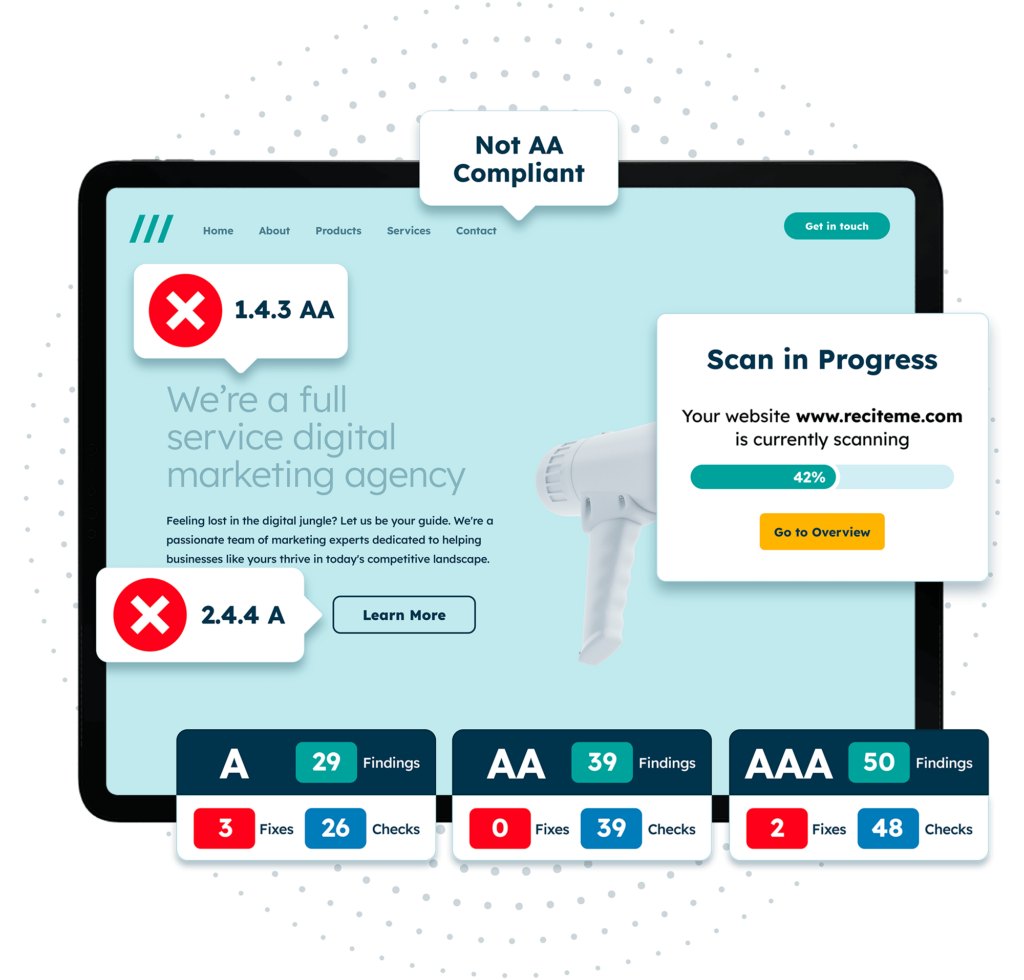
Start your ADA compliance journey today
Achieving and maintaining ADA compliance is not a one-time task and often requires a combination of auditing, assistive technology, and ongoing education. Recite Me has developed a suite of accessibility solutions to support businesses at each stage of their accessibility journey:
- Accessibility Checker: Identifies common website accessibility barriers and generates a prioritized list of remediation fixes.
- Assistive Toolbar: Provides end users with tools to customize their browsing experience, including text resizing, color adjustments, screen reader support, and reading aids.
- PDF Accessibility Checker: Reviews and improves the accessibility of PDFs and downloadable documents, ensuring essential information is available to all users.
- Accessibility training: Equips teams with practical guidance on accessibility standards, inclusive design, and ongoing compliance responsibilities.
- Accessibility documentation and reporting: Supports internal accountability and governance by tracking progress, recording improvements, and demonstrating commitment to accessibility.
- Free guidance resources: Top picks for ADA compliance include our US Accessibility Laws & Regulations Guide, ADA Compliance Checklist, and Accessibility and Inclusion Toolkit.
Using the right tools and resources helps your business move from awareness to action, making accessibility improvements more manageable, measurable, and sustainable over time.
Unsure where to start or want support meeting ADA compliance requirements? Download your free accessibility scan or contact us to discuss how we can help you improve.
ADA compliance requirements for business – FAQs
Need a quick recap or TL;DR version? The following FAQs address the most common questions businesses have about ADA compliance for websites and online platforms.
Is ADA compliance mandatory?
Yes. Title I employment obligations apply only to employers with 15 or more employees. However, Title III applies to all businesses that offer goods or services to the public, regardless of size. Small businesses are not exempt.
What types of businesses are affected by ADA digital accessibility laws?
Any business that provides goods or services to the public may be affected. This includes e-commerce retailers, online service providers, professional services, hospitality businesses, and education or training providers.
Do online-only businesses have ADA compliance obligations?
Yes. Businesses that operate exclusively online are not exempt from ADA compliance. Courts have found that inaccessible digital services can still deny equal access, even when no physical location exists.
What standard is used to assess ADA website compliance?
Current enforcement actions and legal settlements consistently reference the Web Content Accessibility Guidelines (WCAG). WCAG 2.2 Level AA is widely accepted as the benchmark for meeting the latest accessibility standards.
How can I reduce the risk of an ADA compliance lawsuit?
Start by proactively identifying and fixing common accessibility barriers, conducting regular accessibility audits, aligning digital content with WCAG standards, and maintaining documentation that demonstrates an ongoing commitment to accessibility.
Need more help becoming ADA compliant?
The following resources are packed full of actionable tips and expert advice for making your digital content compliant with the Americans with Disabilities Act:
Free ADA Accessibility Training
Take the first step to ADA compliance by completing our training course.
Free ADA Accessibility Guide
Ensure your organization is meeting the requirements for ADA compliance.

